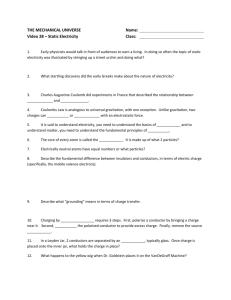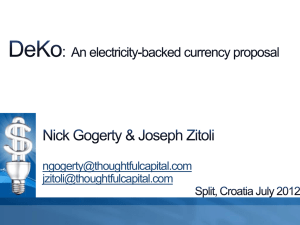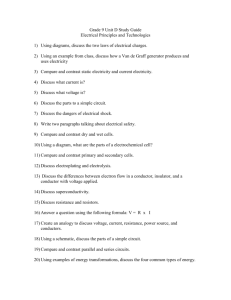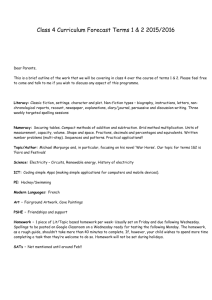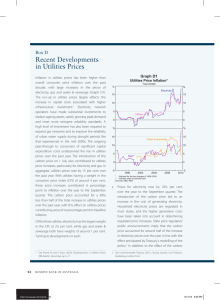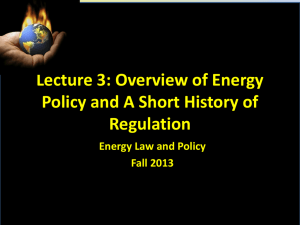Intermediate Microeconomics 73-250
advertisement
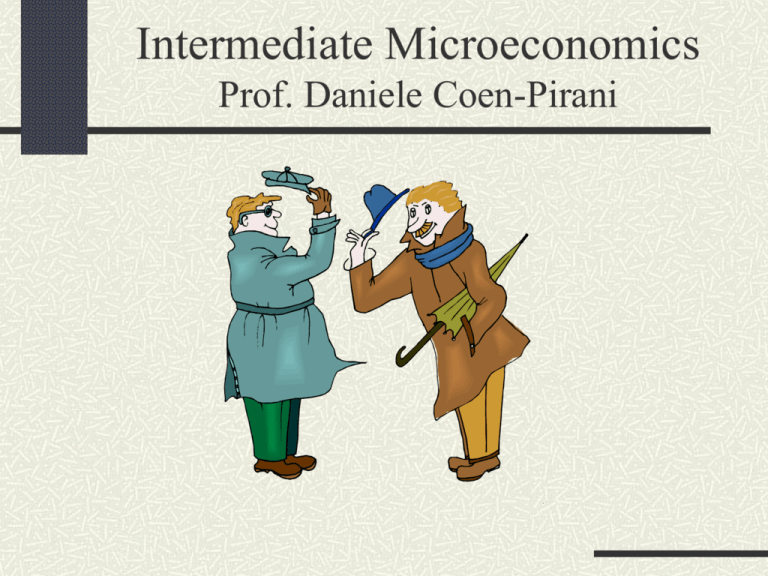
Intermediate Microeconomics Prof. Daniele Coen-Pirani Introduction ECONOMICS MACROECONOMICS Studies Aggregate Economic Events e.g. Business Cycles, Economic Growth MICROECONOMICS Studies Behavior Individual Agents e.g. Consumers, Firms, Individual Markets Consumer Theory Budget constraint Preferences and utility Choice Individual demand Market demand and equilibrium Theory of the Firm Technology Profit maximization Firm supply Industry supply Monopolies and Oligopolies What are the differences between monopolistic and competitive markets? What causes monopolies? Oligopoly Externalities and Public Goods Do prices reflect the true costs and benefits of firms’ and consumers’ actions? Private goods and public goods: the freerider problem Example: Deregulation of Power Industry in California Before deregulation: Pacific Gas & Electric was a monopoly regulated by the state State set rates and guaranteed return on investment to PG&E Northern Californians paid 50 percent more for electricity than national average Deregulation in 1996 Idea: allow for more competitors in production of electricity to bring prices down PG&E had to sell its power plants The Market for Electricity Generators Utilities Consumers Transition period Concern that in short-run the number of power plants was fixed Thus, from 1996 to late 2000 statemandated price caps kept prices charged by Utilities to Consumers low However, prices charged by Generators to Utilities were deregulated immediately Electricity Consumption in California Growth in Electricity Consumption since 1994 60% 50% 40% Sylicon Valley All California 30% 20% 10% 0% '94 '96 '98 '00 '02 '04 Wholesale Electricity Prices Cost of a kilowatt-hour of electricity $0.35 $0.30 $0.25 $0.20 $0.15 $0.10 $0.05 $0.00 Northern California Southern California 9 Ja 9 n- 99 l-99 t-99 -00 -00 l-00 t-00 n pr Ju Oc pr Ju Oc a J A A Now Utilities are going broke: buy electricity at 30 cents (per kilowatt-hour), sell it at 5 cents Generators are making large profits In areas where price caps were removed (San Diego) prices tripled Risk of power shortages What went wrong? No new power plants built after 1996: Not enough competition among Generators Subsidized consumption of electricity: Consumers do not perceive real price of electricity (consume too much) What about the Environment? "There is this demand to create cheap power, but what about the externalities, water pollution, air pollution ... Older plants can produce cheap electricity but they pollute a lot more." (Eric Wesselman, Union of Concerned Scientists). Course Organization Web: www.andrew.cmu.edu/ course/73-250spring/ micro.htm Grades: 2 midterms (50%): February 19 & April 9 Final (35%) 6 problem sets (15%) Course Organization Textbook: Intermediate Microeconomics by Hal Varian & Workouts Recitations Office hours: TUE & THU 2pm-3pm The Math You Need to Know Univariate calculus Drawing graphs of functions (in 2 dimensions) Finding maxima and minima of functions of one variable




